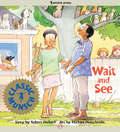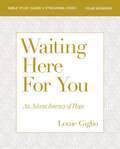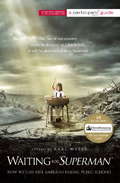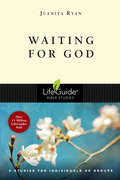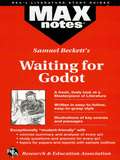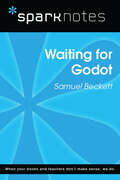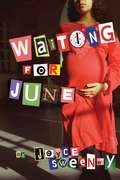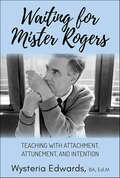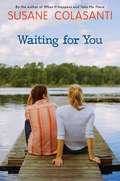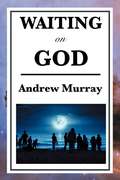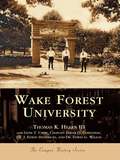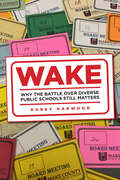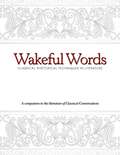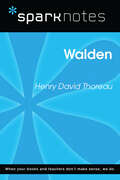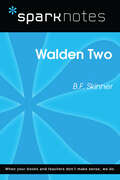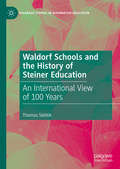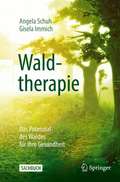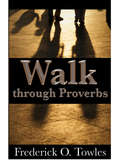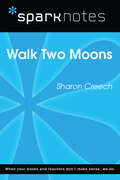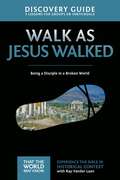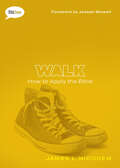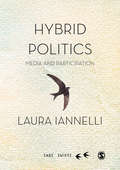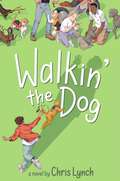- Table View
- List View
Wait and See
by Robert Munsch Michael MartchenkoIt is Olivia's birthday, and when she blows out the candles on her cake and makes a wish--she gets exactly what she wanted!
Waiting Here for You Bible Study Guide plus Streaming Video: An Advent Journey of Hope
by Louie GiglioWaiting is not wasted when waiting on the Lord.A season overflowing with anticipation, Christmas comes the same time each year with great hope and promise of a baby born long ago. But this season meant for joy is often consumed by busyness, pressure, mixed emotions, and is gone as quickly as it came. What is it all for? In this four-session study, pastor Louie Giglio reminds us that it&’s in the richness of Advent—a season of expectant waiting and preparation—that we find our answer. And it is throughout this waiting season that we prepare our hearts to greet December 25th with joy, peace, hope, and refreshed promise in our newborn King.This study guide has everything you need for a full Bible study experience, including:Individual access to four streaming video sessionsA guide to best practices for leading a groupVideo notes and a comprehensive structure for small group discussion timePersonal study for deeper reflection between sessions.Sessions and video run times: God Is Working While You Wait (16:30)God Will Use Your Waiting (17:30)Waiting on God and with God (17:00)God Is Waiting for You (17:00)Watch on any device!Streaming video access code included. Access code subject to expiration after 12/31/2028. Code may be redeemed only by the recipient of this package. Code may not be transferred or sold separately from this package. Internet connection required. Void where prohibited, taxed, or restricted by law. Additional offer details inside.
Waiting for "SUPERMAN: How We Can Save America's Failing Public Schools
by edited by Karl Weber Participant MediaEach book includes a $15 gift card from DonorsChoose. org to give to a classroom in need. The American public school system is in crisis, failing millions of students, producing as many drop-outs as graduates, and threatening our economic future. By 2020, the United States will have 123 million high-skill jobs to fill--and fewer than 50 million Americans qualified to fill them. Educators, parents, political leaders, business people, and concerned citizens are determined to save our educational system. Waiting for "Superman" offers powerful insights from some of those at the leading edge of educational innovation, including Bill and Melinda Gates, Michelle Rhee, Geoffrey Canada, and more. Waiting for "Superman" is an inspiring call for reform and includes special chapters that provide resources, ideas, and hands-on suggestions for improving the schools in your own community as well as throughout the nation. For parents, teachers, and concerned citizens alike, Waiting for "Superman" is an essential guide to the issues, challenges, and opportunities facing America's schools.
Waiting for God (LifeGuide Bible Studies)
by Juanita RyanWe spend much of our life waiting. For healing for ourselves or a friend. For a wayward daughter to return to God. For a new job. For marriage and children and grandchildren. Sometimes the waiting can cause us to feel stuck, or forgotten by God. But waiting time is not wasted time. In this eight-session LifeGuide Bible Study by Juanita Ryan help you draw near to God in times of uncertainty and postponement. As she leads you and your group through significant moments of waiting in Scripture, you will become familiar with the dynamics of such times and learn to hear God?s call to rest in his timing. For over three decades LifeGuide Bible Studies have provided solid biblical content and raised thought-provoking questions—making for a one-of-a-kind Bible study experience for individuals and groups. This series has more than 130 titles on Old and New Testament books, character studies, and topical studies.
Waiting for Godot (MAXNotes Literature Guides)
by Rita WilenskyREA's MAXnotes for Samuel Becketts's Waiting for Godot MAXnotes offer a fresh look at masterpieces of literature, presented in a lively and interesting fashion. Written by literary experts who currently teach the subject, MAXnotes will enhance your understanding and enjoyment of the work. MAXnotes are designed to stimulate independent thought about the literary work by raising various issues and thought-provoking ideas and questions. MAXnotes cover the essentials of what one should know about each work, including an overall summary, character lists, an explanation and discussion of the plot, the work's historical context, illustrations to convey the mood of the work, and a biography of the author. Each chapter is individually summarized and analyzed, and has study questions and answers.
Waiting for Godot (SparkNotes Literature Guide Series)
by SparkNotesWaiting for Godot (SparkNotes Literature) by Samuel Beckett Making the reading experience fun! Created by Harvard students for students everywhere, SparkNotes is a new breed of study guide: smarter, better, faster. Geared to what today's students need to know, SparkNotes provides: *Chapter-by-chapter analysis *Explanations of key themes, motifs, and symbols *A review quiz and essay topicsLively and accessible, these guides are perfect for late-night studying and writing papers
Waiting for June
by Joyce SweeneyIn the third trimester of her pregnancy, Florida high school senior Sophie tries to discover the identity of the father she has never known, while adamantly refusing to disclose the name of her own baby's father.
Waiting for Mister Rogers: Teaching with Attachment, Attunement, and Intention
by Wysteria EdwardsEvery day children enter classrooms crying out for love and relief. Waiting for Mister Rogers reveals a Kindergarten teacher's journey to find answers for the broken children entering her classroom—and the wounds in her own heart—through the personal notes, speeches, and writings of Fred Rogers. Many moments of adversity, violence, and suffering can be traced back to broken attachments in childhood. These early attachment wounds follow children into adulthood, often damaging their interpersonal relationships. Where the world offers shallow and complex solutions, the gentle work of Mister Rogers models simple and deep ways to heal insecure attachment. Waiting for Mister Rogers, answers questions of personal development and connection for anyone seeking support, such as:What do children need to be securely attached? How can teachers heal their wounds to be fully present, intentional, and effective with their students? Could student be triggering a teacher’s childhood trauma? Can teachers go deeper while doing less?It's time to remember childhood, return to the Neighborhood and teach with attachment, attunement, and intention. Mister Rogers was right all along!
Waiting for You
by Susane ColasantiAt the beginning of her sophomore year, Marisa is ready for a fresh start and, more importantly, a boyfriend. So when the handsome and popular Derek asks her out, Marisa thinks her long wait for happiness is over. But several bumps in the road—-including her parents’ unexpected separation, a fight with her best friend, and a shocking disappointment in her relationship with Derek—-test Marisa’s ability to maintain her new outlook. Only the anonymous DJ, whose underground podcasts have the school’s ear, seems to understand what Marisa is going through. But she has no idea who he is—or does she? In this third romantic novel from Susane Colasanti, Marisa learns how to “be in the Now” and realizes that the love she’s been waiting for has been right in front of her all along.
Waiting on God
by Andrew MurrayWaiting on God is Andrew Murray's wonderful thirty one day devotional that will help you come closer to God. "If salvation indeed comes from God, and is entirely His work, just as creation was, it follows, as a matter of course, that our first and highest duty is to wait on Him to do the work that pleases Him. Waiting becomes then the only way to the experience of a full salvation, the only way, truly, to know God as the God of our salvation." -Andrew Murray
Wake Forest University (Campus History)
by Thomas K. Hearn III Gene T. Capps Chaplain Edgar Christman Dr J. Hendricks Dr Edwin WilsonWake Forest College was founded in 1834 to train Baptist ministers. Now a nationally and internationally recognized university, it is renowned for both its graduate and undergraduate programs. Over 6,000 students attend this university nestled within the beauty of the North Carolina Piedmont. The school's motto, pro humanitate, meaning "for the good of humanity," reflects the university's emphasis on the importance of values, ideals, human service experiences, and faith in the educational process. Wake Forest University explores the founding of the college in 1834, its move to Winston-Salem in 1956, and its development into a modern university beginning in the 1960s. The enduring spirit of Wake Forest is celebrated in this memorable collection of more than 200 vintage photographs. Wake Forest University features many notable alumni that walked the campus pathways including Arnold Palmer, Tim Duncan, Brian Piccolo, W.D. Cash, and Al Hunt.
Wake: Why the Battle over Diverse Public Schools Still Matters (Critical Issues in American Education)
by Karey Alison HarwoodThe Wake County Public School System was once described as a beacon of hope for American school districts. It was both academically successful and successfully integrated. It accomplished these goals through the hard work of teachers and administrators, and through a student assignment policy that made sure no school in the countywide district became a high poverty school. Although most students attended their closest school, the “diversity policy” modified where some students were assigned to make sure no school had more than 40% of its students qualifying for free or reduced-price lunch or more than 25% performing below grade level. When the school board election of 2009 swept into office a majority who favored “neighborhood schools,” the diversity policy that had governed student assignment for years was eliminated. Wake: Why the Battle Over Diverse Public Schools Still Matters tells the story of the aftermath of that election, including the fierce public debate that ensued during school board meetings and in the pages of the local newspaper, and the groundswell of community support that voted in a pro-diversity school board in 2011. What was at stake in those years was the fundamental direction of the largest school district in North Carolina and the 14th largest in the U.S. Would it maintain a commitment to diverse schools, and if so, how would it balance that commitment with various competing interests and demands? Through hundreds of published opinion articles and several in depth interviews with community leaders, Wake examines the substance of that debate and explores the community’s vision for public education. Wake also explores the importance of knowing the history of a place, including the history of school segregation. Wake County’s example still resonates, and the battle over diverse public schools still matters, because owning responsibility for the problem of segregated schools (or not) will shape the direction of America’s future.
Wakeful Words: Classical Rhetorical Techniques in Literature
by Classical ConversationsRhetorical techniques in literature: A companion to literature of classical conversations.
Walden (SparkNotes Literature Guide Series)
by SparkNotesWalden (SparkNotes Literature Guide) by Henry David Thoreau Making the reading experience fun! Created by Harvard students for students everywhere, SparkNotes is a new breed of study guide: smarter, better, faster. Geared to what today's students need to know, SparkNotes provides chapter-by-chapter analysis; explanations of key themes, motifs, and symbols; and a review quiz and essay topics. Lively and accessible, these guides are perfect for late-night studying and writing papers.
Walden Two (SparkNotes Literature Guide Series)
by SparkNotesWalden Two (SparkNotes Literature Guide) by B.F. Skinner Making the reading experience fun! Created by Harvard students for students everywhere, SparkNotes is a new breed of study guide: smarter, better, faster. Geared to what today's students need to know, SparkNotes provides: *Chapter-by-chapter analysis *Explanations of key themes, motifs, and symbols *A review quiz and essay topicsLively and accessible, these guides are perfect for late-night studying and writing papers
Waldorf Schools and the History of Steiner Education: An International View of 100 Years (Palgrave Studies in Alternative Education)
by Thomas StehlikThis book marks the centenary of the first Waldorf School, established by Rudolf Steiner in Stuttgart in 1919. With around 1,150 Waldorf Schools and over 1,800 Waldorf Kindergartens established in over 60 countries, this book examines and analyses how the initial impulse of Steiner education has grown over the last century to become a worldwide alternative movement in education. The author documents and compares the growth and development of Waldorf schools and Steiner-inspired educational institutions around the world, and determines the extent to which the original underpinning philosophy has been maintained against the contexts and challenges of contemporary global trends in education. Within such diverse international contexts, it is significant that the schools retain such a distinctive identity, and clearly redefine how ‘alternative education’ can be viewed. This comprehensive volume will be of interest and value to scholars of Steiner education and Waldorf schools as well as alternative education more widely.
Waldtherapie - das Potential des Waldes für Ihre Gesundheit
by Angela Schuh Gisela ImmichIm schnelllebigen Alltag wird es immer wichtiger, einen Gegenpol zu finden. Der Wald scheint dafür wie geschaffen – er bietet ausgleichende Reize, gesundheitsfördernde Effekte und sein Klima ist nachgewiesen wirksam. Das Sachbuch erklärt auf wissenschaftlich fundierter Basis die Hintergründe und Fakten zur Wirkung von Waldaufenthalten und sensibilisiert Leserinnen und Leser für den großen Gesundheitsnutzen von Waldbaden (Shinrin-yoku) und Waldtherapie. Der Wald lädt als Ruheoase ein zu entschleunigen, zu regenerieren und neue Energie zu schöpfen. Geschrieben für interessierte Laien – Psychotherapeuten, Ärzte und andere Gesundheitsberufe können mitlesen. Aus dem Inhalt: Wie der Wald und sein Klima auf uns wirkt – Wie Sie den Wald und seine Atmosphäre für Ihre Gesundheit entdecken und nutzen können. Die Autorinnen: Prof. Dr. Dr. Angela Schuh und Gisela Immich, M.Sc., beforschen an der Ludwig-Maximilians-Universität München die Wirkungen von Wald und Klima auf die Gesundheit und entwickeln Konzepte für die präventive Waldnutzung und Waldtherapie.
Walk Through Proverbs
by Frederick O. TowlesWalk Through Proverbs is a journey through the book of Proverbs containing thought provoking questions, and an invitation to journal through the book of wisdom. For four months, this book will give you daily inspiration and practical application straight from scripture, and to your heart.
Walk Two Moons (SparkNotes Literature Guide Series)
by SparkNotesWalk Two Moons (SparkNotes Literature Guide) by Sharon Creech Making the reading experience fun! Created by Harvard students for students everywhere, SparkNotes is a new breed of study guide: smarter, better, faster. Geared to what today's students need to know, SparkNotes provides: *Chapter-by-chapter analysis *Explanations of key themes, motifs, and symbols *A review quiz and essay topicsLively and accessible, these guides are perfect for late-night studying and writing papers
Walk as Jesus Walked Discovery Guide: Being a Disciple in a Broken World (That the World May Know)
by Ray Vander Laan Stephen And SorensonThis five-session video-based small group bible study (DVD/digital video sold separately) by noted teacher and historian, Ray Vander Laan, is volume seven of the That the World May Know series. In this volume, Vander Laan helps you experience how the disciples translated Jesus’ call to passionate discipleship into language and imagery the Roman culture already understood. Faith Lessons is a unique video series that brings God's Word to life with astounding relevance. By weaving together the Bible's fascinating historical, cultural, religious, and geographical contexts, teacher and historian Ray Vander Laan reveals unique insights into the Scriptures' significance for modern believers. Each lesson: Focuses on passages of Scripture explored in the DVD Includes sidebars, maps, photos and other study tools Features questions that facilitate discussion and inspire personal reflection Includes 25 personal Bible studies to help you deepen your learning experience between sessions, and turn lessons from the past into applications that impact how you live out your faith today. Filmed on location in Aphrodisias, Antioch Pisidia, Lystra, and Cappadocia, these illuminating "faith lessons" afford a new understanding of the Bible that will ground your convictions and transform your life. The Faith Lessons video series is ideal for use in small groups, personal and family Bible studies, and adult Sunday school. Individual believers and families will gain vital insights from long-ago times and cultures through this innovative approach to Bible study. Lessons include: Run! The Passion of Elijah – Filmed in Aphrodisias Learning to Walk Like Jesus – Filmed in Antioch Pisidia An Unlikely Disciple – Filmed in Lystra Why Christians Suffer: The Weight of Gesthemane – filmed in Cappadocia Don’t Forget Us – filmed on location in Cappadocia Designed for use with the Walk As Jesus Walked Video Study (sold separately).
Walk: How to Apply the Bible (Bible Savvy Series)
by James L. NicodemHow do we draw practical applications from the Bible?Reading the Bible should be like gazing into a mirror—we should look for a true reflection of ourselves and note the changes that need to be made in our lives. But how is this done?Pastor Jim Nicodem encourages us in this difficult but vitally important challenge. Using the COMA method (Context, Observation, Message, Application), he offers helpful and understandable instruction on how a Christian can learn to &“walk&” what the Bible teaches as we go through life.Perfect for believers at any stage and those discipling others, Walk is a wonderful guide for those seeking to follow Jesus, honor God, and walk in the way of the Word.
Walk: How to Apply the Bible (Bible Savvy Series)
by James L. NicodemHow do we draw practical applications from the Bible?Reading the Bible should be like gazing into a mirror—we should look for a true reflection of ourselves and note the changes that need to be made in our lives. But how is this done?Pastor Jim Nicodem encourages us in this difficult but vitally important challenge. Using the COMA method (Context, Observation, Message, Application), he offers helpful and understandable instruction on how a Christian can learn to &“walk&” what the Bible teaches as we go through life.Perfect for believers at any stage and those discipling others, Walk is a wonderful guide for those seeking to follow Jesus, honor God, and walk in the way of the Word.
WalkThru 5-step guides to build great teaching (USA Edition)
by Tom SherringtonThe Teaching WalkThrus series of books have sold more than 250,000 copies worldwide. Now, WalkThru creators Tom Sherrington and Oliver Caviglioli have curated a selection of essential five-step teaching techniques aimed at US schools and educators.The five-step instructional coaching guides are explained by Sherrington's concise direction and Caviglioli's signature iconography and cover all the key areas of teaching: behaviour and relationships; curriculum planning; explaining and modelling; questioning and feedback; practice and retrieval; and Mode B teaching.The featured WalkThrus have been selected from the original trilogy of books and adapted especially for the US.The WalkThrus books are supported by an online PD toolkit, which is now used by 3,000 organisations in 40 countries.
Walker. Exaggerated Claims: The ESRC, 50 Years On (SAGE Swifts)
by David Walker"David Walker s analysis is incisive and hard hitting. Anyone who believes in the power of social science to inform better policy making should take his criticisms seriously. " - Sue Duncan, Former Chief Government Social Researcher and Head of the Government Social Research Service "David Walker has written an unofficial summary of ESRC's achievements and struggles. He brings to the task long experience of the organisation and of the key players, a great familiarity with the literature and a sceptical nature. The result is stimulating, instructive, contentious and sometimes even infuriating. " - David Rhind, Chair of the Nuffield Foundation What is the role of the state in distributing research money? How do 'arm's-length' funding agencies relate to public policy and business? This original study looks at the main social science funding agency in the UK, which was established 50 years ago. It examines how funding decisions are related to power. The 'critical' and policy' aspects of successful research bids are discussed. Walker asks the tricky question, why has social science research not achieved a more salient role in state policy formation and management strategy: is the funding agency responsible? Insightful, engrossing and highly original, the book will be required reading for anyone who has written or will write a Social Science research bid and, more widely, for students of power, knowledge and culture. "
Walkin' the Dog
by Chris Lynch&“Lynch is back and better, smarter, and funnier than ever.&” —Jacqueline Woodson, National Book Award Winner A boy learns how to be a friend from man&’s best friend in this funny and moving middle grade novel about humans being able to change and dogs changing us from acclaimed author Chris Lynch.In a family of strong personalities with very strong points of view, Louis is what his mother lovingly calls &“the inactivist,&” someone who&’d rather kick back than stand out. He only hopes he can stay under the radar when he starts high school in the fall, his first experience with public school after years of homeschooling. But when a favor for a neighbor and his stinky canine companion unexpectedly turns into a bustling dog-walking business, Louis finds himself meeting an unprecedented number of new friends—both human and canine. Agatha, a quippy and cagey girl his age always seems to be telling two truths and a lie. Cyrus, a few years his senior, promises he&’s going to show Louis how to be a better person, whether Louis wants him to or not. And then there are the dogs: misbehaving border terriers, the four (possible stolen) sausage dogs, the rest of Louis&’s charges, and a mysterious white beast who appears at a certain spot at the edge of the woods. Dogs and human alike all seem to have something they want to teach Louis, including his menacing older brother who keeps turning up everywhere. But is Louis ready to learn the lesson he needs most: how to stop being a lone wolf and be part of a pack?
